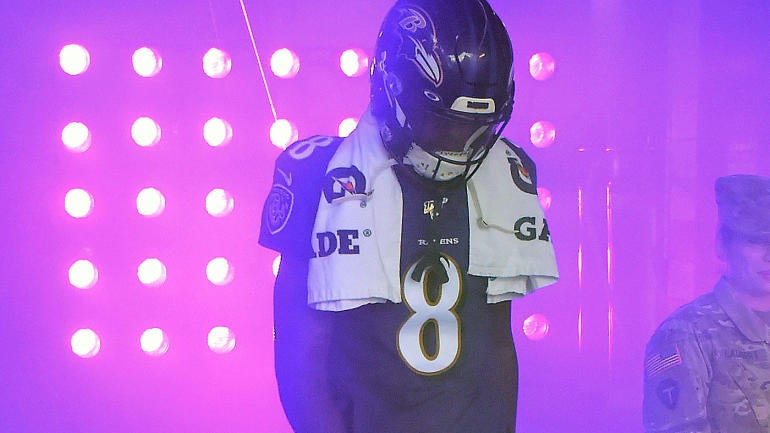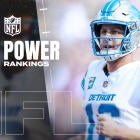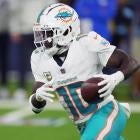
When Lamar Jackson and the Baltimore Ravens fell flat against the Buffalo Bills on Saturday night, missing out on a potential AFC Championship bid, they didn't just drop out of the playoffs. They also reignited big-picture questions about the sustainability of their run-heavy offense, which often relies far more on Jackson's legs than his arm. On an even broader scale, Jackson's latest postseason defeat raises a question about the quarterback position in general: Are running QBs doomed to fail in big games?
Jackson, for example, has now advanced past his first playoff game just once in three years, and the luster of his 2019 MVP breakout seemingly pales in comparison to the resume of fellow youngster Patrick Mahomes. Granted, Mahomes' arm is one of the best the league has seen for a while, but that's also the point; as a passer, it's his arm that always gives the Chiefs a chance. But are we nitpicking Jackson's early-career run? And isn't Mahomes a runner, too? The guy is on the move an awful lot, no?
How, then, are we to accurately judge whether running QBs are less effective on the big stage? First, it's important to differentiate mobile QBs and running QBs. This is not an exact science. With each era of football comes new standards when it comes to QB play. Take Steve Young, the 49ers legend: In today's league, his rushing numbers would be roughly equivalent to those of Daniel Jones, but in his day, he was a generational dual threat. Here and now, however, it's fairly easy to assign QBs to one of three tiers:
- True runners
- Frequent movers
- Pocket passers
The eye test alone is a pretty easy way to classify most QBs. Drew Brees stays in the pocket. Patrick Mahomes moves around. Lamar Jackson runs. If you want to boil it down to numbers, 100+ carries works as a rough barometer for a QB who's often, if not always, running the ball. Four guys cleared that mark in 2020: Jackson, Cam Newton, Kyler Murray and Josh Allen. But there's room for nuance even there, as the stats and eye test remind us that Allen and Murray are far more consistent and/or deadly as passers than Newton and Jackson. The next drop-off in terms of QB rushes, at least in 2020, comes after about 80 carries, which Deshaun Watson, Russell Wilson and Taysom Hill cleared this year.
Again, as you can see, this is no exact science. But just for a point of reference, here's how those assignments -- for the most mobile QBs of 2020 -- would look:
True runners: Lamar Jackson, Kyler Murray, Cam Newton, Josh Allen
Frequent movers: Russell Wilson, Deshaun Watson, Taysom Hill
The only oddity here might be Hill, who's clearly more of a natural runner, but whose numbers are skewed by the fact he plays almost exclusively as a gadget option behind Brees in New Orleans. None of this, of course, suggests that other QBs -- like Daniel Jones or Ryan Tannehill or Mitchell Trubisky -- aren't mobile or frequent movers. It's just meant to narrow our focus to the guys whose legs significantly or even solely influence their above-league-average production.
Still with us? Then it's time to answer the real question: Can you win with these QBs? We know guys like Mahomes and Aaron Rodgers can win while flexing their mobility, but what about the guys who rely on their legs more than almost anyone else in the NFL
For that, we turn to the last decade of postseason action, reviewing the record of frequent movers in the playoffs since 2011. Remember, we're defining frequent movers as QBs who rush at least 85 times in a season.
- 2020: Josh Allen (2-0), Lamar Jackson (1-1), Russell Wilson (0-1)
- 2019: Deshaun Watson (1-1), Lamar Jackson (0-1), Josh Allen (0-1)
- 2018: Lamar Jackson (0-1), Deshaun Watson (0-1)
- 2017: Cam Newton (0-1), Tyrod Taylor (0-1)
- 2016: None
- 2015: Cam Newton (2-1), Russell Wilson (1-1), Alex Smith (1-1)
- 2014: Russell Wilson (2-1), Cam Newton (1-1)
- 2013: Russell Wilson (3-0), Colin Kaepernick (2-1), Cam Newton (0-1)
- 2012: Russell Wilson (1-1), Robert Griffin III (0-1)
- 2011: Tim Tebow (1-1)
Combined record: 18-19
Conference championship record: 4-0
Super Bowl record: 1-3
So, what can we learn from this? To be frank, not a ton. Even if you narrow the pool of QBs to true runners (guys with at least 100 rushes), the combined record (10-12) isn't much different. While the Super Bowl record isn't great, albeit with an incredibly small sample size, that's offset by the perfect conference championship record. We hate to be the bearers of bad news (well, more like anticlimactic news), but the playoff record of especially mobile QBs is stunningly average. Not great. But not damning, either.
This, of course, puts all the weight on the QBs themselves, when in reality, we all know entire teams play a part in the highs and lows of the game's mobile stars. Jackson, for instance, may be capable of airing it out far more, but the Ravens proactively choose to center their offense on the run. Wilson, on the other hand, might run it even more if not for Seattle's preference to establish a busy backfield behind him. But if we're truly focusing just on the QBs who move, at least the last decade seems to suggest that guys who rely a lot on their legs give you about as good of a chance of winning big games as the pocket passers who easily outnumber them in the playoffs.
In fact, that last point might be the biggest takeaway of all: Mobile QBs, whether good, bad or right in between under the spotlight of postseason play, remain a serious minority in the NFL. Between 2011-2020, there were 122 different QBs who opened the postseason as starters -- 12 each year from 2011-2019, and 14 this season. Of those 122 QBs, only 21, or about 17 percent, entered the playoffs as either "frequent movers" or "true runners," by our rough standards presented here. In other words, for every Lamar Jackson that makes the postseason, there are consistently about five Tom Bradys or Joe Flaccos or Kirk Cousins.
That doesn't always mean there are less mobile QBs overall. Plenty of speedy signal-callers have racked up stats while missing the playoffs over the years. Oftentimes, though, the reality is simply that traditional passers remain the tradition. Not that pocket passers can't move, but that they -- and by extension, their teams -- tend to win, or at least up until the playoffs, when they utilize their arm far more than their legs.

















